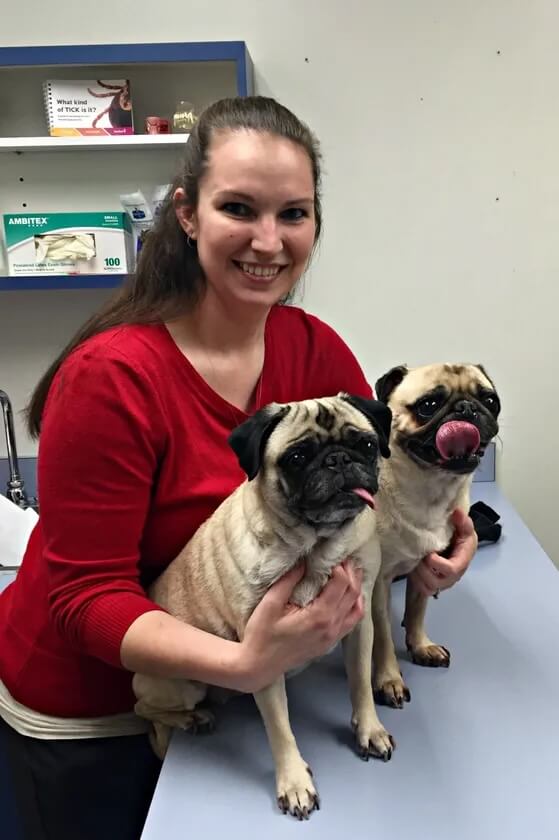Our team at Pine Hollow Veterinary Services believes that prevention is always the best medicine. We are dedicated to providing your best friend with the quality of care so that he or she can live a long and happy life with you.
What to expect with your pet at one of our wellness visits:
 For our younger patients under the age of 7, we recommend a comprehensive physical exam once a year. Each year we will tailor your pet’s needs according to their lifestyle. We will develop a vaccination and wellness care program that best fits you and your pet.
For our younger patients under the age of 7, we recommend a comprehensive physical exam once a year. Each year we will tailor your pet’s needs according to their lifestyle. We will develop a vaccination and wellness care program that best fits you and your pet.
- For our gracefully aging patients over the age of 7, we recommend a comprehensive physical exam every 6 months. As we all know, our pets age much faster than we do, so twice-a-year exams will help us to create a wellness program designed to monitor these life changes. You know your pet better than anyone, so together we can develop a plan that best fits your pet’s needs.
What occurs during a physical exam?
During an exam, our veterinarians will check your pet to ensure your pet's health including:
- Vital signs: Temperature, pulse, and respiration
- Weight: Weighing your pet
- Skin and coat: Bumps, lumps, parasites, dandruff, bald patches, shedding, and excessive oiliness or dryness
- Nails and feet: Overgrown nails, damage, or signs of health concerns
- Mouth and teeth: Decay, damage, or periodontal disease
- Eyes: Redness, cloudiness, eyelid issues, excessive tearing, or discharge
- Ears: Signs of bacterial infection, ear mites, wax build-up, or polyps
- Abdomen: Palpation of internal organs for pain, or discomfort
- Joints and mobility: Poor mobility can suggest health problems such as arthritis
- Posture and walk: Irregularities, lameness, or limited range of motion
- Mental status: How awake and alert they are, if they can focus on you, and if they have two equal-sized pupils
- Lungs and heart: Listening for crackles and wheezing associated with lung issues and for a normal heart rate and rhythm, as well as murmurs
Our team will discuss any changes in lifestyle or abnormal medical conditions since the last wellness exam. We encourage our pet owners throughout the year to note any changes in their pet’s habits and communicate them with our staff.
During exams, our staff may recommend yearly bloodwork. Bloodwork is a diagnostic tool used to check a pet’s health and prevent illness, find abnormalities, recheck a condition that needs monitoring, or as an annual requirement for medication to monitor a pet’s organ function. Bloodwork for heartworm medication is done to detect if the pet is positive for heartworm disease.
Here are a few of the conditions identified from a patient’s bloodwork:
- Anemia: Elevated levels of reticulocytes, or immature red blood cells, may indicate a regenerative form of anemia
- Blood disorders
- Addison's disease
- Diabetes
- Hormonal imbalances
- Hyper-/hypothyroidism
- Immune disorders
- Kidney disease
- Liver disease
- Lyme disease
- Nutritional deficiencies
- Protein levels: Low levels of serum protein may be caused by poor nutrition or malabsorption of nutrients
- Toxin exposure
What vaccinations do we recommend?
We also provide a series of vaccines for our patients at the time of a wellness exam. A vaccine will help a patient’s immune system so the pet will not get sick or have a less severe illness if exposed. Vaccines depend on a pet’s lifestyle, geographic location, and regulations. We recommended core vaccines that will help keep your pet safe from any diseases carried by infectious organisms.
Canine:
Distemper, Hepatitis, Leptospirosis, Parainfluenza, Parvovirus, Coronavirus, Lyme, Bordetella and Rabies
Feline:
Feline Leukemia, Rhinotracheitis, Calici, Panleukopenia, and Rabies
Have you heard about Vaccination Value Packages? Ask the next time you schedule your pet’s wellness appointment.
We highly encourage our clients to ask about Vaccine Value Packages that will save clients time and money for their healthy pets that only need their yearly examination, vaccines, and possibly bloodwork.
